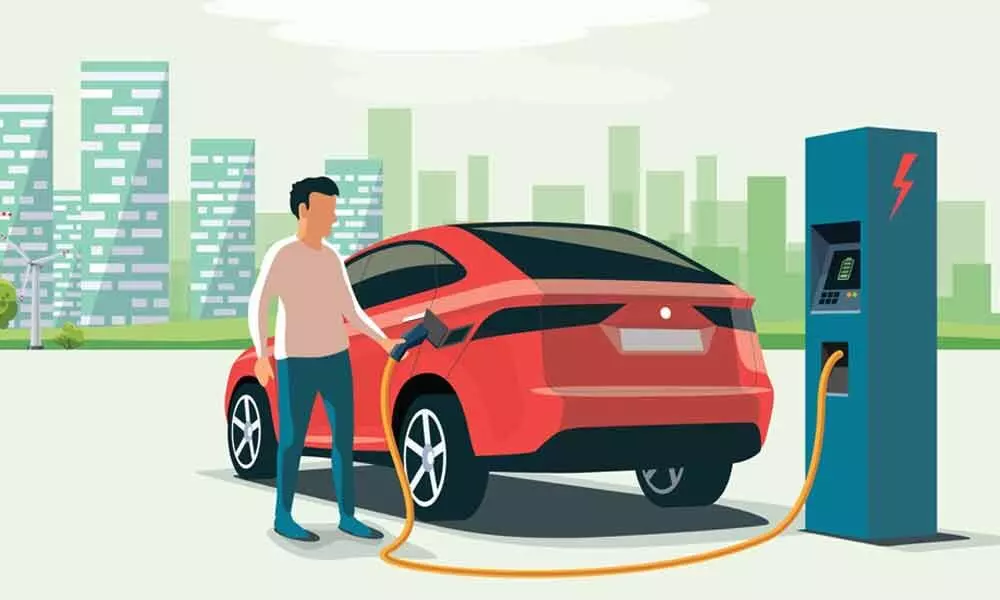Live
- Over 7,600 Syrians return from Turkiye in five days after Assad's downfall: minister
- Delhi BJP leaders stay overnight in 1,194 slum clusters
- Keerthy Suresh and Anthony Thattil Tie the Knot in a Christian Ceremony
- AAP, BJP making false promises to slum dwellers for votes: Delhi Congress
- 'Vere Level Office' Review: A Refreshing Take on Corporate Life with Humor and Heart
- Libya's oil company declares force majeure at key refinery following clashes
- Illegal Rohingyas: BJP seeks Assembly session to implement NRC in Delhi
- Philippines orders full evacuation amid possible volcanic re-eruption
- Government Prioritizes Welfare of the Poor, says Dola Sri Bala Veeranjaneyaswamy
- Two Russian oil tankers with 29 on board damaged due to bad weather
Just In

Sale of Electric cars rise by 140 per cent in the first quarter of 2021
The sale of Electric cars rose by 140 per cent in the first quarter of 2021, breaking last year's record of 41 per cent surge on EV (Electric Vehicle)...
The sale of Electric cars rose by 140 per cent in the first quarter of 2021, breaking last year's record of 41 per cent surge on EV (Electric Vehicle) registrations despite the pandemic hitting the economies badly. In 2020, consumer spending on EVs touched 120 billion dollars while car registrations rose by 41 per cent.
International Energy Agency (IAE) says, last year electric cars made up 4.6 per cent of overall car sales. People spent 50 per cent more than the previous year to buy a record three million electric cars.
In 2020 the global average Battery Electric Vehicle (BEV) price was around 40,000 dollars and for the plug-in hybrid electric vehicle, it was 50,000 dollars.
For this year, IAE said in its Global EV Outlook report that China emerged as the biggest spender. Around 500,000 electric vehicles were sold in China, the largest market for automobiles globally, followed by 450,000 across Europe.
Sales in the US also doubled compared to the same three-month period last year. However, the IAE said, the increase was from a relatively lower base.
The IEA said in the report, said, "Even before the pandemic many countries were strengthening key policies such as CO2 emissions standards and zero-emission vehicle (ZEV) mandates. By the end of 2020, more than 20 countries had announced bans on the sales of conventional cars or mandated all new sales to be ZEVs."
It added, "Additional incentives to safeguard EV sales from the economic downturn: some European countries increased their purchase incentives and China delayed the phase-out of its subsidy scheme. The number of EV models expanded and battery cost continued to fall."
In the context of India, IEA said, India's efforts to control pollutant emissions from vehicles moved into high gear in April 2020 when it imposed Bharat Stage VI (BS-VI) standards, (which are largely aligned with Euro 6 standards), on new sales of motorcycles, light-duty and heavy-duty vehicles. The jump directly from BS-IV to BS-VI forces manufacturers to make significant changes to vehicle designs in a short period. Investment by some Indian OEMs focus on ICE models meeting BS-VI standards, thereby delaying investment in BEV deployment. These OEMs have indicated that they are facing losses due to slumps in auto sales from reduced demand during the pandemic.
The Faster Adoption and Manufacturing of Electric Vehicles (FAME II) scheme is India's key national policy-relevant for EVs. It allocates USD 1.4 billion over three years from 2019 for 1.6 million hybrid and electric vehicles (including two/three-wheelers, buses and cars) and includes measures to promote domestic manufacturing of EVs and their parts. However, more than halfway to the April 2022 end date only 3 per cent of the allocated funds have been used for a total of just 30 000 vehicles.
Significant acceleration will be required to reach both the programme targets and national targets of 30 per cent EV sales by 2030. Some critics blame the lack of supply-side policy instruments such as ZEV sales requirements or ICE phase-out targets to hasten EV adoption, while others have indicated the limited availability of EV models for average consumers.
State and urban governments have also started efforts to fast track road vehicle electrification. In February 2021, the chief minister of New Delhi announced the Switch Delhi awareness campaign to highlight its ambitious EV policy introduced in August 2020. The policy targets 25 per cent electrification of vehicle sales in 2024 and 50 per cent of all new buses to be battery-electric. Other cities such as Kolkata, Pune, Nagpur and Bangalore continue to transform their fleets. It also says in India new electric bus registrations increased 34 per cent to 600 in 2020.
The International Energy Agency thinks that the EV industry is on track for a decade of strong expansion. But IEA executive director, Fatih Birol says, electric vehicles have an indispensable role to play in reaching net-zero emissions worldwide. He said current sales trends are very encouraging, but our shared climate and energy goals call for even faster market uptake.

© 2024 Hyderabad Media House Limited/The Hans India. All rights reserved. Powered by hocalwire.com







